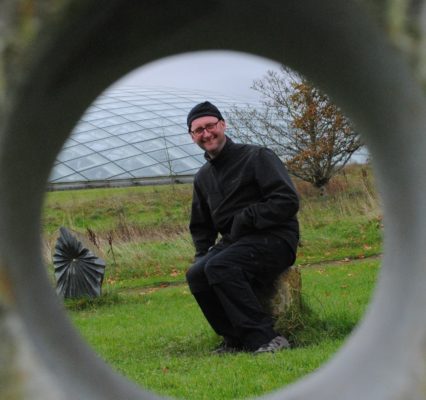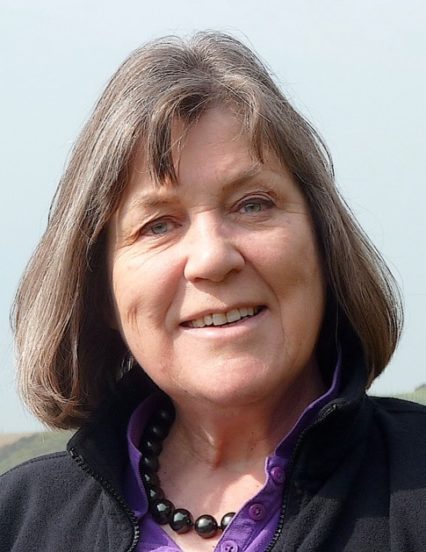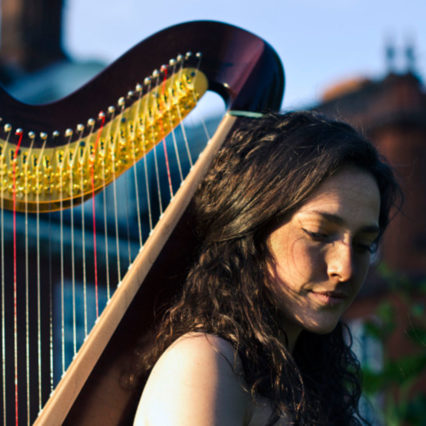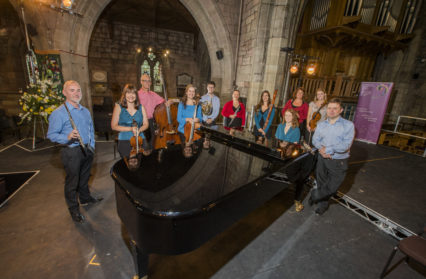Cath Barton heads to the Chapter Arts Centre in Cardiff for a live chamber music performance by Bangor-based Ensemble Cymru.
Bangor-based Ensemble Cymru has been promoting chamber music in Wales since 2003, commissioning new work from Welsh composers as well as programming existing repertoire for strings and wind instruments. The ensemble has a particular interest in showcasing the contributions of the different instruments to the whole, and over the past two years its Artistic Director Peryn Clement-Evans and principal harpist Anne Denholm have co-curated a project exploring instrumental combinations featuring the harp.

The programme for this concert in Chapter’s Seligman Theatre, the first in a tour of Wales as the finale of Ensemble Cymru’s 15th anniversary season, duly featured the harp throughout. It was also fitting that a work for harp was included in the Composer Spotlight on the music of Gareth Churchill which preceded the main event – the first of three composer spotlight features to be included in the Ensemble’s tour, organised in conjunction with Tŷ Cerdd and Composers of Wales.
Gareth introduced three solo works from his output over the past seven years, describing them as conversational, the instrument in question being in conversation with itself. Southill (2017), receiving its first performance from double bass player Mike Escreet, and Westholm (2016), played by cellist Heather Bills, were quite cerebral works, two of a set of four taking their inspiration from compass points and using the relevant Welsh, English and German letters of the alphabet translated into musical notation.
To me the clearest conversation was in Annwn (2010) for harp. It tells of that place in the Mabinogion where the hounds of hell co-exist with the fountains of eternal youth. The musical ideas of strummed chords, twinkling high notes and resonant slaps of the strings were used to portray very effectively a dialogue between lyricism and menace. After playing the piece, harpist Ben Creighton Griffiths spoke of his appreciation of having a composer who understood the harp, as opposed to those who treated it like a piano on its side and did not realise that harpists do not play with their little finger, so that patterns of notes in groups of five are very difficult to play. I myself appreciated having the voices of both composer and interpreter in the room. It was a fascinating half hour.
I also appreciated the introductions by Ensemble Cymru’s Artistic Director to both the Composer Spotlight and the works in the Anniversary Finale Concert. This to me is not just about conveying information; it is about establishing a connection with the audience, which is surely beneficial to audience and performers alike, and so in the service of the music.
The first half of the concert began with Handel’s Harp Concerto No 6, a crowd-pleaser but why not? I firmly believe in giving an audience some music in a style with which they are familiar in preparation for something new. In the Handel and throughout the concert, the harpist was Anne Denholm, playing with sparkle and panache, giving the lie to any notion of the harp as a background or ‘tame’ instrument.

Rhian Samuel introduced her piece Emerging (Lightly) (2008), which was commissioned by The Mobius Ensemble for their 10th anniversary as one of a series of birthday ‘candles’, each featuring a different instrument; she had been asked to write for the viola as the principal instrument. The viola, played with a sure touch by long-standing member of Ensemble Cymru Oliver Wilson, negotiates a lyrical thread through the piece so as to weave something in the style of an American folk song from initially disparate fragments played on flute, clarinet, harp, two violins and cello; fragments which, as it were, fall out of it again at the end.
The first half concluded with Arnold Bax’s Nonet (1930). Bax was a prolific composer, but how many of his pieces are played these days? Maybe we would hear more of him if he had been more restrained in his scoring. Certainly if this concert had taken place in, say, the resonant acoustic of a church, it would have been difficult to identify the different colours of the different instruments, something so vital in chamber music.

Anne Denholm on the harp took centre stage again in Debussy’s Dances for Harp and String Quintet (1904), a piece commissioned from the composer by the Parisian firm Pleyel for their new chromatic harp. Rival firm Erard, who were producing a pedal harp, commissioned Ravel to write his Introduction and Allegro (1905). It turned out that both pieces could be played on Erard’s instrument, but the Ravel could not be played on the Pleyel. The pedal harp won out. It’s difficult to imagine instrument manufacturers commissioning composers in the same way nowadays.
The final piece in this concert, receiving its first performance, was commissioned by Ensemble Cymru for this tour from Anglesey composer Gareth Glyn. To the Four Winds (2018) is a concerto for nine instruments in which there are effectively solos for all. A wonderfully dramatic piece, it gives the stage in turn to the strings, wind and harp, before uniting the instrumental forces in the fourth and final movement. The composer gave a helpful commentary before the performance – being told, for example, that when the double bass player reached his lowest note it marked the transition between movements one and two, helped us to focus on the music rather than wondering ‘where are we now?’
This was a stunning piece, full of life and a wonderful showcase for all the players of Ensemble Cymru. I particularly enjoyed the lament in the first movement for the Halcyon bird which loses its chicks, the lush sounds of love and lust in Zephyros, featuring the harp, flute and oboe, and the final moments of glorious sunrise from the strings. It was a fine conclusion to a splendidly varied concert.
Ensemble Cymru’s Anniversary Finale tour continues during May. In September of this year the Ensemble is collaborating with the North Wales International Music Festival in the launch of the first National Chamber Music Day for Wales.
Ensemble Cymru
Anniversary Finale
Artistic Director and clarinet, Peryn Clement-Evans
Flute, Alena Walentin
Principal harp, Anne Denholm
Oboe, Huw Clement-Evans
Violins, Florence Cooke and Elenid Owen
Viola, Oliver Wilson
Cello, Heather Bills
Double bass, Mike Escreet
Seligman Theatre, Chapter Arts Centre, Cardiff
4th May 2018
To learn more about upcoming events at Chapter Arts Centre visit their website.
To learn more about Ensemble Cymru and their upcoming performances visit their website.
Cath Barton is an English writer who lives in Wales. Her novella The Plankton Collector will be published in September 2018 by New Welsh Review. Cath is on the 2018 Literature Wales Mentoring programme, working on a collection of short stories inspired by the work of Hieronymus Bosch.
Recommended for you…
Tracey Rees-Cooke reviews Theatr Genedlaethol Cymru‘s version of Brecht’s classics The Caucasian Chalk Circle at Pontio in Bangor.



 Enjoyed this article? Support our writers directly by buying them a coffee and clicking this link.
Enjoyed this article? Support our writers directly by buying them a coffee and clicking this link.







